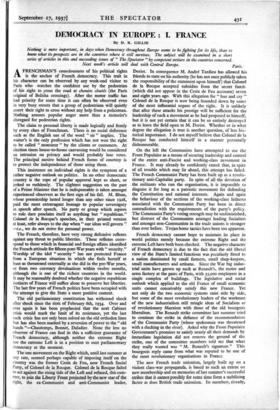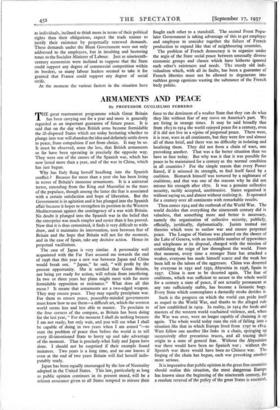DEMOCRACY IN EUROPE : I. FRANCE
By D. R. GILLIE
Nothing is more important, in days when Democracy throughout Europe seems to be fighting for its life, than to know what its prospects are in the countries where it still survives. The subject will be examined in a short series of articles in this and succeeding issues of " The Spectator " by competent writers in the countries concerned.
Next week's article will deal with Central Europe. Paris.
AFRENCHMAN'S consciousness of his political rights is the anchor of French democracy. This trait in his character can be observed by any week-end visitor to Paris who watches the confident use by the pedestrian of his right to cross the road at chemins cloutes (the Paris original of Belisha crossings). After the motor traffic has had priority for some time it can often be observed even in very busy streets that a group of pedestrians will quietly assert their right to cross without any help from a policeman. Nothing arouses popular anger more than a motorist's disregard for pedestrian rights.
The claim to personal liberty is made logically and firmly by every class of Frenchman. There is no social deference such as the English use of the word " sir " implies. The waiter's is the only profession which has not won the right to be called " monsieur " by the clients or customers. At election times house-to-house canvassing would be considered an intrusion on privacy and would probably lose votes. The principal motive behind French forms of courtesy is to protect the independence of those using them.
This insistence on individual rights is the symptom of a rather negative outlook on politics. In no other democratic country is the rope of popular approval kept so short, or jerked so ruthlessly. The slightest suggestion on the part of a Prime Minister that he is indispensable is taken amongst experienced observers as the first sign of his fall. M. Blum, whose premiership lasted longer than any other since 1928, paid the most extravagant homage to popular sovereignty in speech after speech. No party or group which aspires to rule dare proclaim itself as anything but " republican." Colonel de la Rocque's speeches, in their printed version at least, refer always to the day when " our ideas will govern " —i.e., we do not strive for personal power.
The French, therefore, have very strong defensive reflexes against any threat to public liberties. These reflexes corre- spond to those which in financial and foreign affairs identified the French attitude for fifteen post-War years with" security." Worship of the idol " security " has not protected France from a European situation in which she feels herself at least as threatened externally as she did in the pre-War years, or from two currency devaluations within twelve months, although she is one of the richest countries in the world. It may be reasonably doubted whether the negative republican instincts of France will suffice alone to preserve her liberties. The last few years of French politics have been occupied with the attempt to give the State a more positive content.
The old parliamentary• constitution has withstood shock after shock since the riots of February 6th, 1934. Over and over again it has been prophesied that the next Cabinet crisis would mark the limit of its resistance, yet the last such crisis has not only been solved on the old orthodox lines but has also been marked by a reversion of power to the " old hands "—Chautemps, Bonnet, Daladier. None the less no observer of France can find in this a sufficient guarantee of 'French democracy, although neither the extreme Right lot the extreme Left is in a position to oust parliamentary ,iemocracy at the moment.
The one movement on the Right which, until last summer at any rate, seemed perhaps capable of imposing itself on the country was the former Croix de Feu, now French Social Party, of Colonel de la Rocque. Colonel de la Rocque failed to act against the rising tide of the Left and refused, this sum- mer, to join the Liberty Front projected by the new star of the right, the ex-Communist and anti-Communist leader, Doriot. In consequence M. Andre Tardieu has allowed his friends to state on his authority (he has not once publicly taken the responsibility of the statement upon himself) that Colonel de la Rocque accepted subsidies from the secret funds (which did not appear in the Croix de Feu accounts) seven and eight years ago. With this allegation for " hue and cry " Colonel de la Rocque is now being hounded down by some of the most influential organs of the right. It is unlikely that after these attacks his prestige will be sufficient for the leadership of such a movement as he had proposed to himself, but it is not yet certain that it can be so entirely destroyed as to leave the field open to M. Doriot. Whether or in what degree the allegation is true is another question, of less his- torical importance. I do not myself believe that Colonel de la Rocque has conducted himself in a manner personally dishonourable.
On the left the Communists have attempted to use the Front Populaire as a means of securing leadership and control of the entire anti-Fascist and working-class movement in France. It may already be confidently stated that, in spite of all trouble which may lie ahead, this attempt has failed. The French Communist Party has been built up as a revolu- tionary anti-Capitalist party. In spite of all the devotion of the militants who run the organisation, it is impossible to disguise it for long as a patriotic movement for defending the Constitution and national interests. Again and again the behaviour of the sections of the working-class hitherto associated with the Communist Party has been in direct contradiction with the requirements of the party's policy. The Communist Party's voting strength may be undiminished, but distrust of the Communists amongst leading Socialists and amongst non-Communists in the trade unions is stronger than ever before. Trojan horse tactics have been too apparent.
French democracy cannot hope to maintain its place in world politics merely because the extreme Right and the extreme Left have both been checked. The negative character of French democracy is due to the fact that the old liberal view of the State's limited functions was peculiarly fitted to a nation dominated by small farmers, small shop-keepers, small manufacturers and artisans. Since the War big indus- trial units have grown up such as Renault's, the motor and arms factory at the gates of Paris, with 35,000 employees in a single complex of buildings. The legislative and social outlook which applied to the old France of small economic units cannot conceivably satisfy this new France. Yet not only do the two economic systems exist side by side, but some of the most revolutionary leaders of the workmen of the new industrialism still mingle ideas of Socialism or of revolutionary Marxism with those of the old bourgeois liberalism. The Renault strike committee last summer tried to continue the strike in defiance of the recommendation of the Communist Party (whose spokesman was threatened with a ducking in the river). Asked why the Front Populaire Government's promises to satisfy nearly all their demands by immediate legislation did not remove the ground of the strike, one of the committee members told me that what they really wanted was " M. Renault's signature." This bourgeois reply came from what was reputed to be one of the most revolutionary organisations in France.
The new French trade unionism, largely built up on a violent class-war propaganda, is based to such an extent on new membership and on memories of last summer's successful strikes that it cannot possibly for some time form a stabilising factor as does British trade unionism. Its members, already, as individuals, inclined to think more in terms of their political rights than their obligations, expect the trade unions to justify their existence by perpetually renewed demands. These demands under the Blum Government were not only addressed to the employers, but in insulting and hectoring tones to the Socialist Minister of Labour. Just as nineteenth- century economists were inclined to suppose that the State could support any degree of commercial competition within its borders, so many labour leaders seemed to take it for granted that France could support any degree of social strife.
At the moment the various factors in the situation have fought each other to a standstill. The second Front Popu- lake Government is taking advantage of this to get employer and employee to consider together the failure of French production to expand like that of neighbouring countries.
The problem of French democracy is to organise under the aegis of the State social peace between unusually diverse economic groups and classes which have hitherto ignored each other's existences and needs. Th3 sturdy old indi- vidualism which, with all its faults, has been a guarantor of French liberties must not be allowed to degenerate into ruthless group egotisms wasting the substance of the French body politic.











































 Previous page
Previous page